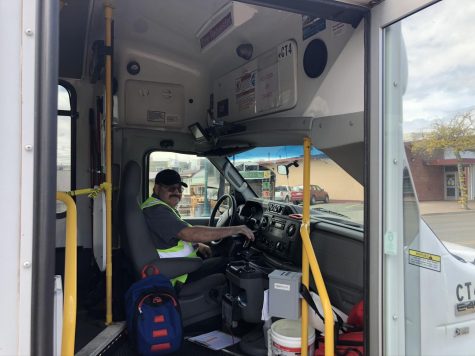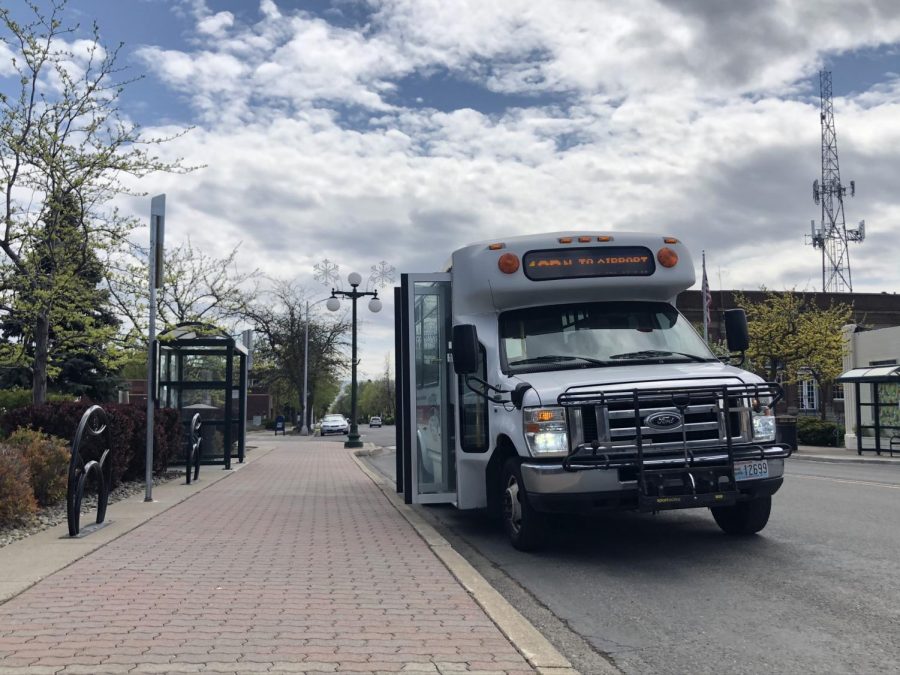Central Transit improves safety measures
In response to the COVID-19 outbreak, riders have been encouraged to distance themselves when inside the transit bus and to avoid usage when ill. Most buses were noticeably empty when arriving at their regularly scheduled stops.
May 13, 2020
On March 23, the Central Transit Facebook page announced they would be increasing safety and social distancing practices in an attempt to protect customers and agency employees. The precautions will be in effect until further notice.
“We do not have any plans to reduce any services at all, we can see by the amount of people that are riding that those riders are using it for essential services,” Betsy Dunbar, City of Ellensburg transit manager said.
Central Transit is a City of Ellensburg service that contracts with Hope Source, who provides drivers and buses, among other services. The transit is a free service for the public and is accessible for anyone, including those with mobility challenges.
There is a complementary paratransit service available for anyone who cannot access public transportation due to a disability, injury or illness and they can qualify for a door-to-door service within the city’s limits.
Mark Holinsworth, the director of operations at Hope Source said they have safety measures within the building for the drivers. The safety measures include hand sanitizer inside the building, masks to wear while in the building, spacing of six to 10 feet in the rest area and then every hour disinfecting everything the drivers touched.

Hollinsworth said drivers sanitize the bus at the beginning of shifts and then sanitizing them at each stop as a safety precaution. He added that there are five routes running and each of those circuits have a time stop which is a designated stop where passengers get on and off the bus. During the time stop, the drivers are sanitizing surface areas, doors, guard rails and seats every 15 minutes.
“We have also blocked off sections of our seats so that we have good distance spacing for those who ride,” Hollinsworth said.
At the end of the day, the drivers thoroughly clean and disinfect buses with a spray of 60 to 40% alcohol approved by the Centers for Disease Control and Prevention which is effective against coronavirus said Dunbar.
Margaret Reich, communications and government relations officer of the City of Ellensburg said the federal government has not given them any requirements; they are following the best practices they have received from the transportation safety administration.
Reich said the drivers have hand sanitizer, masks and safety vests on at all times, and they are taking advanced precautions by watching for passengers who are coughing or unwell and encouraging them to stay home. If passengers need personal protective equipment, the drivers can provide it.
“From the first two weeks of March to the …first couple weeks of April, [riders] have dropped probably from about 1,100 riders to 750 riders in the week,” Dunbar said. “And it is now starting to pick up slowly but there hasn’t been a huge increase yet.”
According to the Central Transit Facebook page, passengers are encouraged to use open seats, practice good hygiene like covering coughs and sneezes and avoiding the transit if symptomatic.
Reich said transportation is an essential service that needs to continue. Especially now that Gov. Inslee announced his phased reopening plan for businesses. Reich said they will continue to see the amount of passengers gain as those phases of the governor’s plan go into effect.
“A lot of our drivers have taken this job because they have a service heart. They want to do a job that they make an income on,” Hollinsworth said. “But they want to do something that makes a difference in their community to support their brother, their neighbor…they feel an obligation to make sure that people have access to food, hospitals, medical care and nutrition.”




Lisa Matthews • May 18, 2020 at 9:15 am
John Doe asks a good question and has every right to be concerned. I worked for Central Transit until yesterday, when I turned in my resignation, specifically because HopeSource has not implemented the majority of the safety measures included in this article in their transit department.
While the rest of the office departments (such as Mr. Hollandsworth’s, which is on the other side of the building complex, as is usual for upper management) are socially distanced and cleaned appropriately, the transit workers are stuffed into a 10×12′ break room. The middle management desks are within three feet of each other. The ONLY person in that part of the building who actually is protected by social distancing is the transit supervisor because she has her own office. The transit area is not cleaned hourly unless the drivers and transit staff do it themselves, as the contracted cleaning crew comes once a week.
Additionally, the buses are not cleaned before shifts or deep-cleaned at night at all and the solution currently being used for disinfecting during the day is made of 10% bleach, not a 40-60% alcohol solution. The cleaning of the buses is at the drivers’ discretion, as is the wearing of any PPE if it is available (and if it is not they have to bring their own). In addition to the younger, ‘healthier’ drivers, older and immuno-compromised drivers have been called back to work under these conditions, putting them at great risk, because a desire to return to ‘normalcy’ is preferred over actually dealing with the situation.
There is no coherent plan in place and the supervisor is never on the buses (or out of her office) to enforce the guidelines that she sends out in random emails. The drivers have been left more/less on their own with little protection and are not even receiving hazard pay or assurances of help with medical bills/testing should they become sick even though they have direct and almost completely unprotected contact with the public on a daily basis. This is particularly true for the part-time drivers, which make up over half the staff.
I don’t care WHAT people’s political and economic beliefs are. This is a matter of health and human safety that involves every resident of Ellensburg and Kittitas County. These people are responsible for the free, safe transportation of everyone in Ellensburg, yet they are being treated like they are disposable, and the health and safety of them and their riders is at risk because of it. If nothing else, the recent outbreak at Twin City Foods should be a wake up call for these people to get it together and put forth a coherent plan that is actually implemented evenly so we can all participate safely in our economy again, not lie to my university’s newspaper so people will have a false sense of security when they ride the bus.
John Doe • May 15, 2020 at 8:31 am
If the drivers are wearing masks on the buses and cleaning them so often then why isn’t the guy in this picture wearing a mask or even seem to have one and where is the cleaning solution? It’s a nice promotional picture but it doesn’t look like the City of Ellensburg or Central Transit is taking protecting public health or preventing spread of this virus seriously at all. I am surprised The Observer even published this and I definitely won’t be riding.